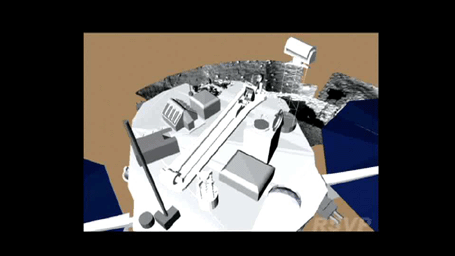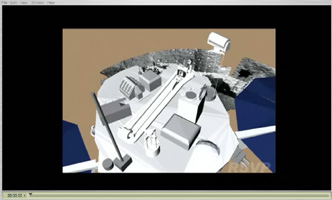
|
Phoenix Stretches its Arm
- Click the image above for a larger view
 Movie Download Options
Movie Download Options- Full-Res JPEG (960 x 540) (34.6 kB)
- Full-Res TIFF (960 x 540) (1.6 MB)
Caption:
The Phoenix spacecraft is scheduled to begin raising its robotic arm up and out of its stowed configuration on the third Martian day, or Sol 3 (May 28, 2008) of the mission. This artist's animation, based on engineering models, shows how Phoenix will accomplish this task. First, its wrist actuator will rotate, releasing its launch-restraint pin. Next, the forearm moves up, releasing the elbow launch-restraint pin. The elbow will then move up and over in small steps, a process referred to as "staircasing." This ensures that the arm's protective biobarrier wrap, now unpeeled and lying to the side of the arm, will not get in the way of the arm's deployment.
The arm is scheduled to straighten all the way out on Sol 4 (May 29, 2008), after engineers have reviewed images and telemetry data from the spacecraft showing that the biobarrier material has been cleared.
Background Info:
The Phoenix Mission is led by the University of Arizona, Tucson, on behalf of NASA. Project management of the mission is by NASA's Jet Propulsion Laboratory, Pasadena, Calif. Spacecraft development is by Lockheed Martin Space Systems, Denver.
Photojournal Note: As planned, the Phoenix lander, which landed May 25, 2008 23:53 UTC, ended communications in November 2008, about six months after landing, when its solar panels ceased operating in the dark Martian winter.
Cataloging Keywords:
| Name | Value | Additional Values |
|---|---|---|
| Target | Mars | |
| System | ||
| Target Type | Planet | |
| Mission | Phoenix | |
| Instrument Host | Phoenix Lander | |
| Host Type | Lander | |
| Instrument | Robotic Arm | |
| Detector | ||
| Extra Keywords | Artwork, Color, Movie, Rotation | |
| Acquisition Date | ||
| Release Date | 2008-05-28 | |
| Date in Caption | 2008-05-28 | 2008-05-29 |
| Image Credit | NASA/JPL-Caltech/University of Arizona | |
| Source | photojournal.jpl.nasa.gov/catalog/PIA10714 | |
| Identifier | PIA10714 | |

